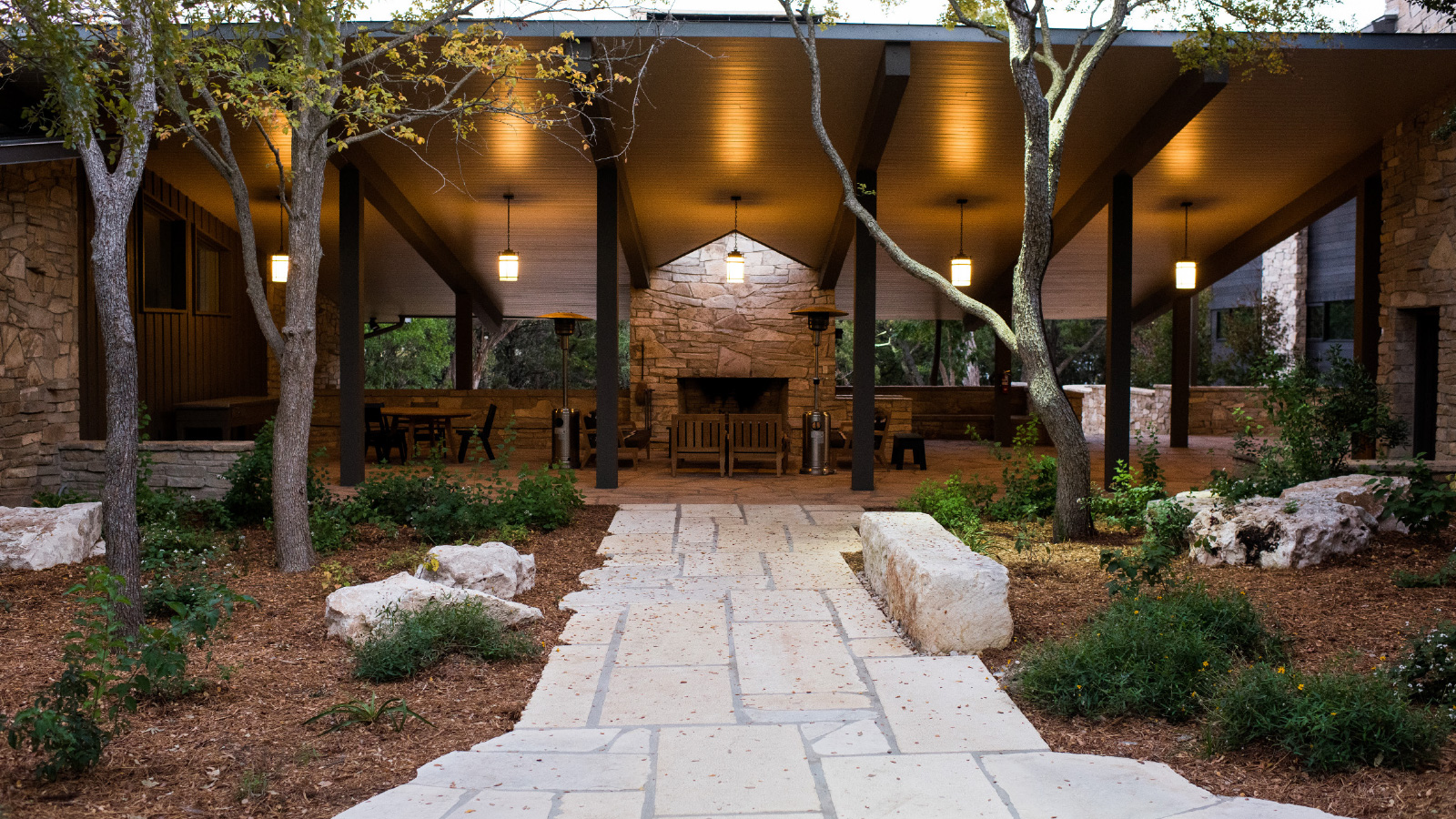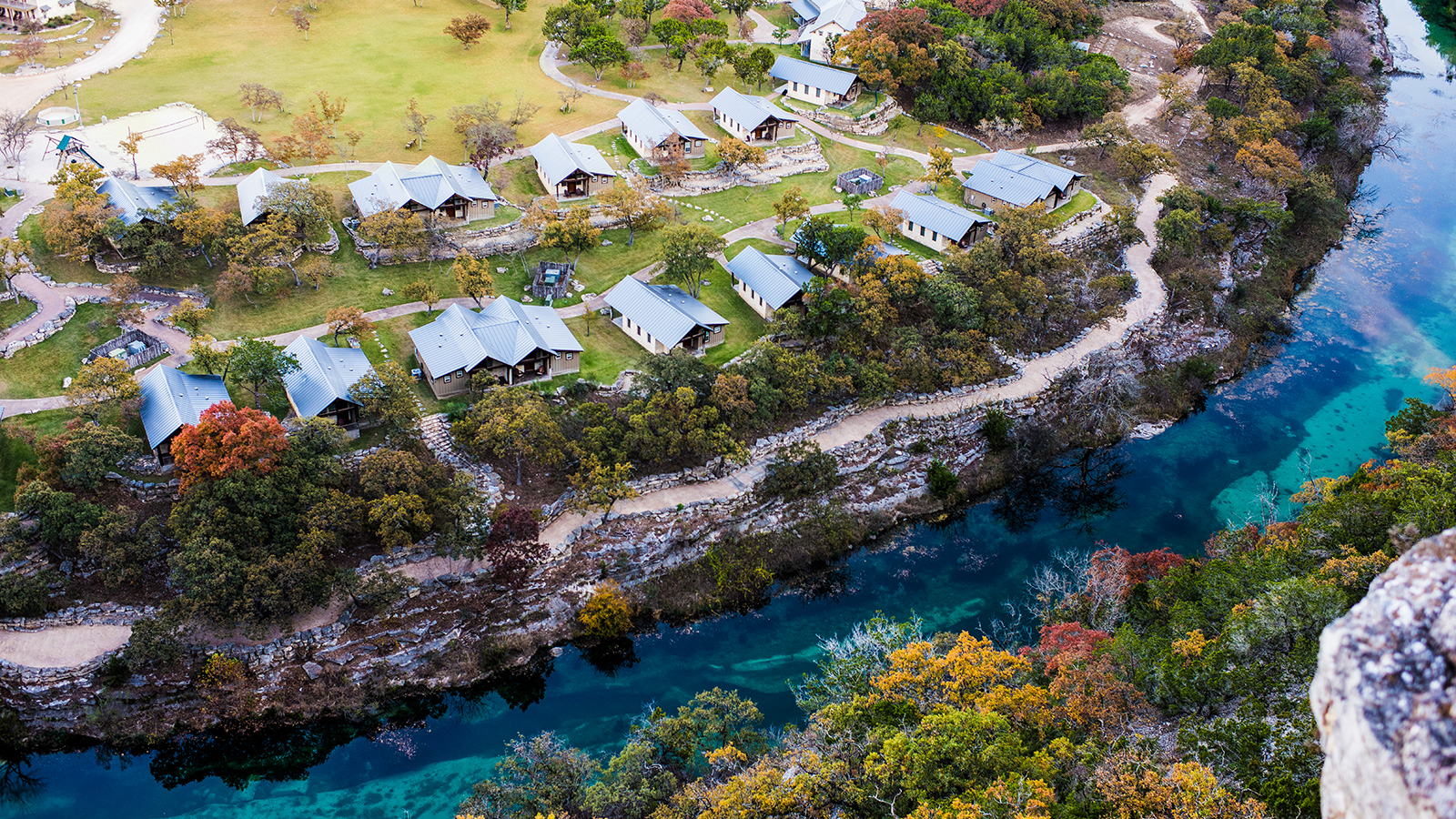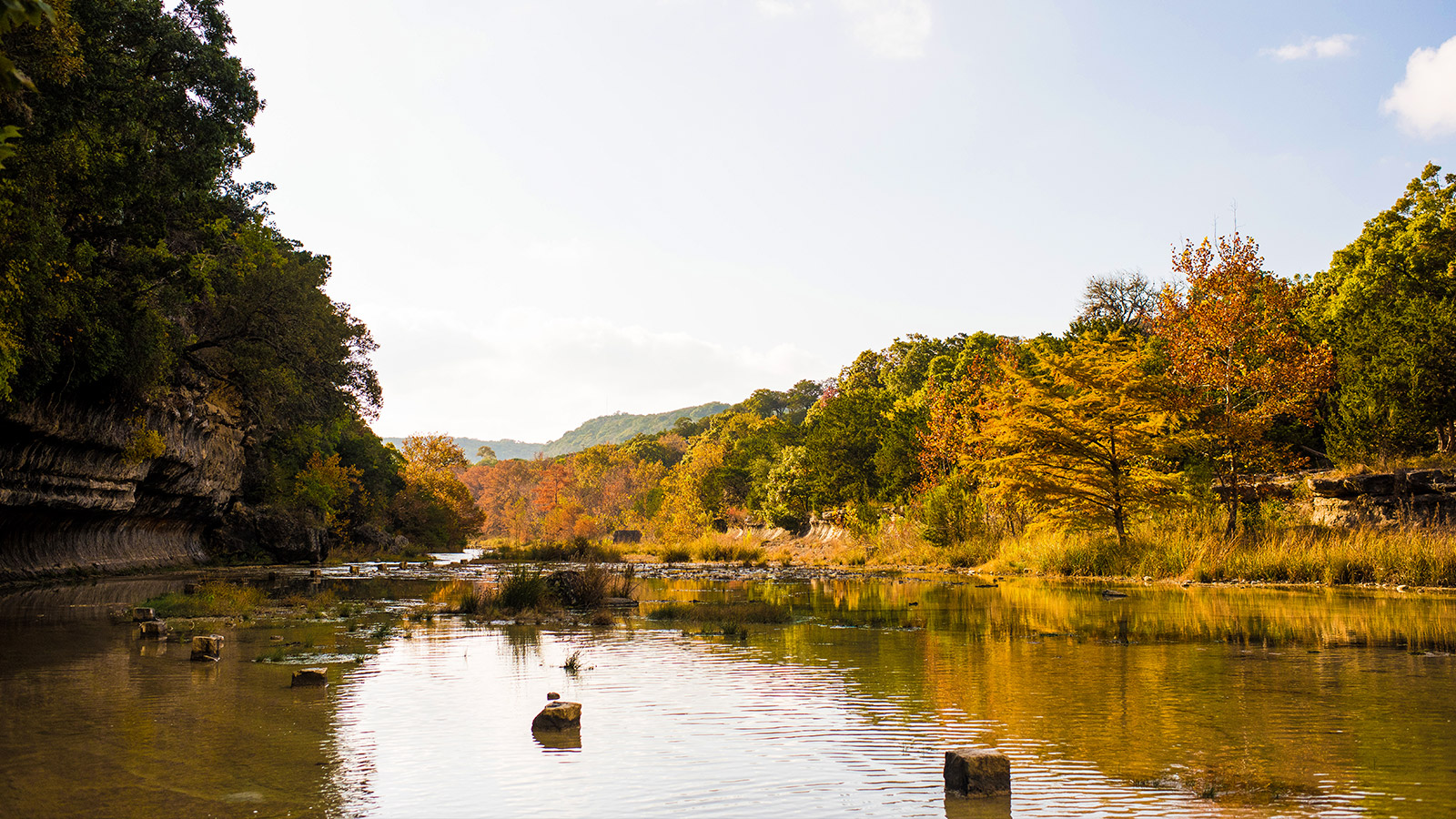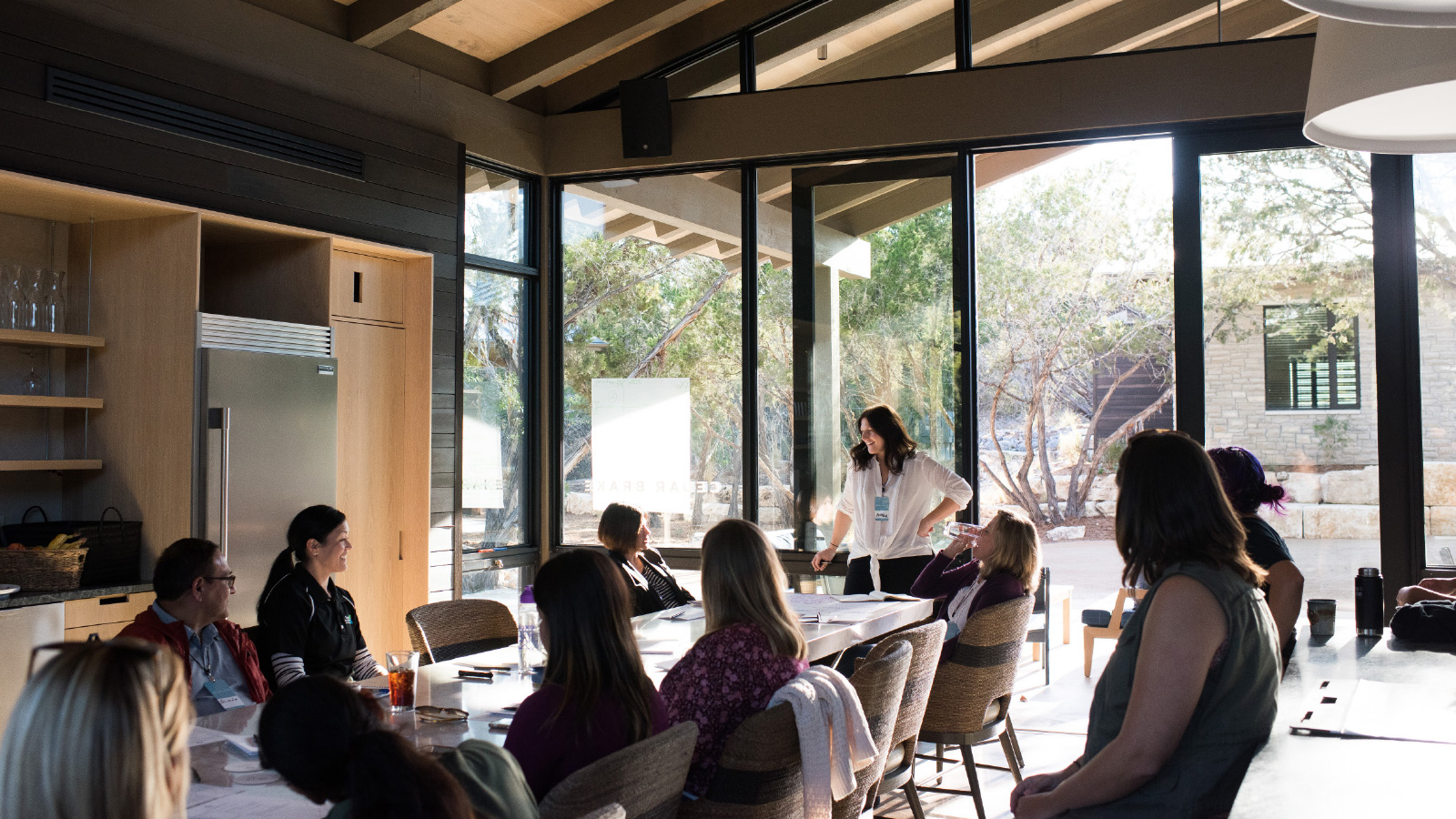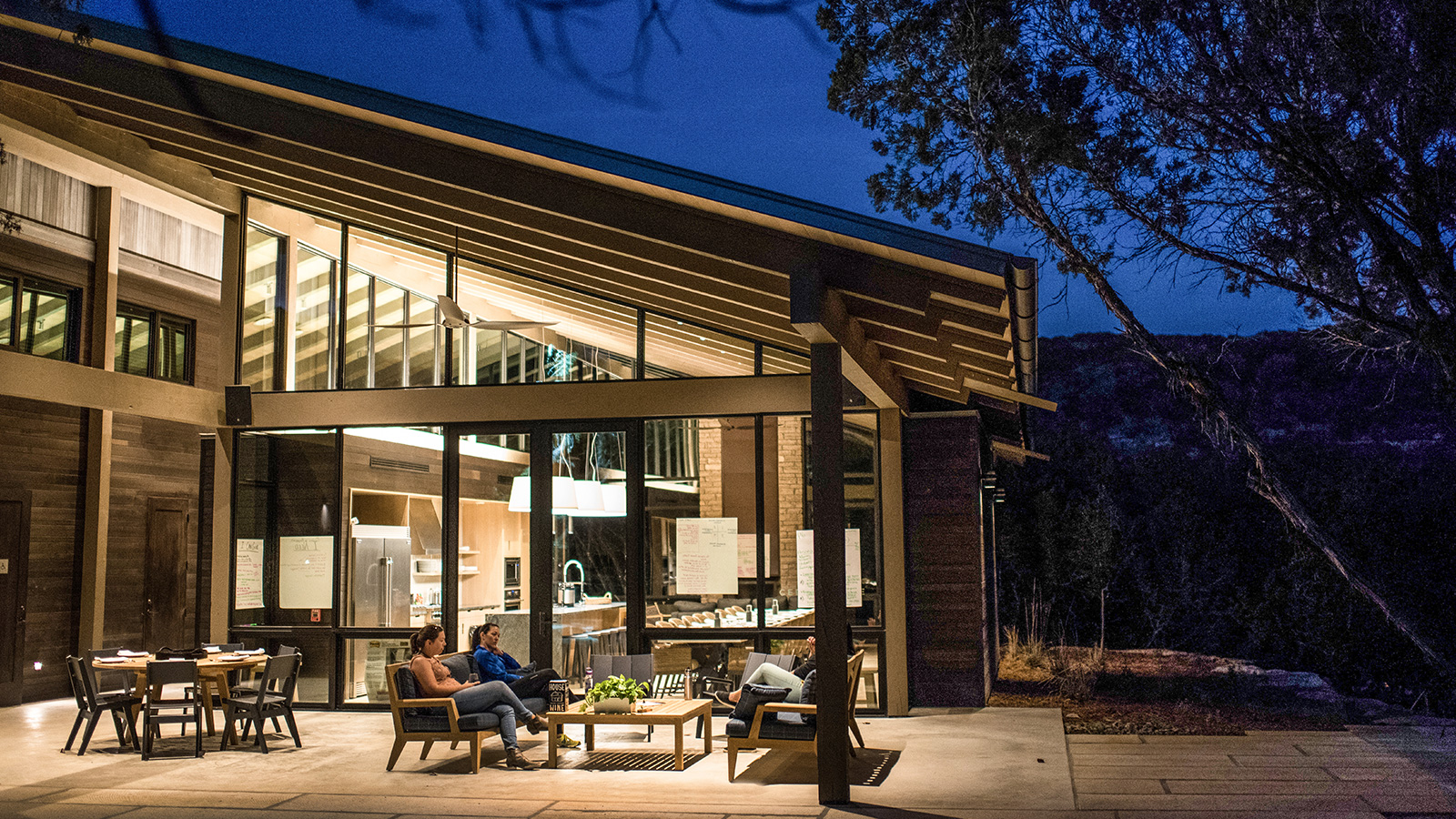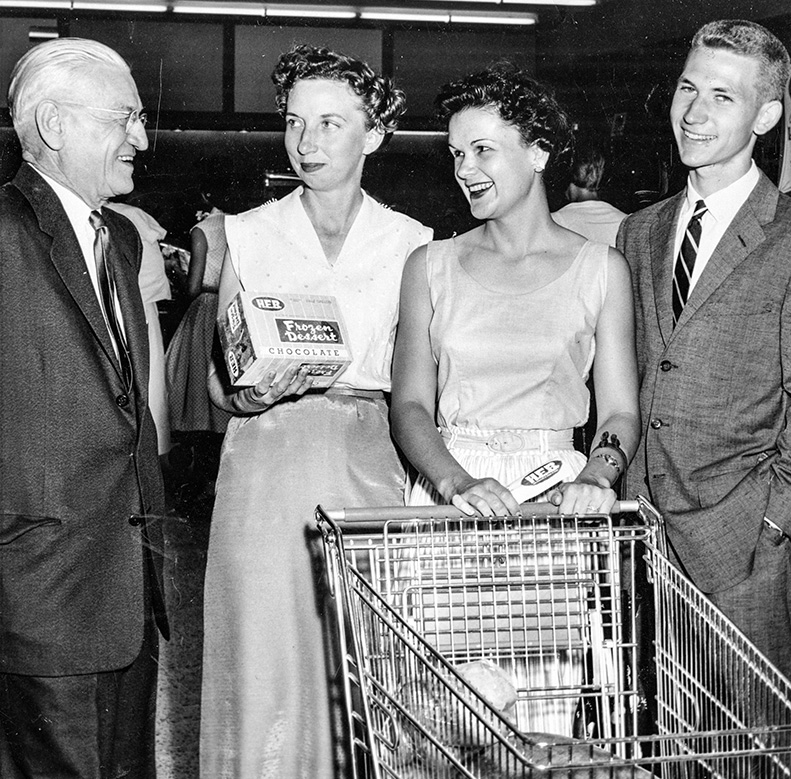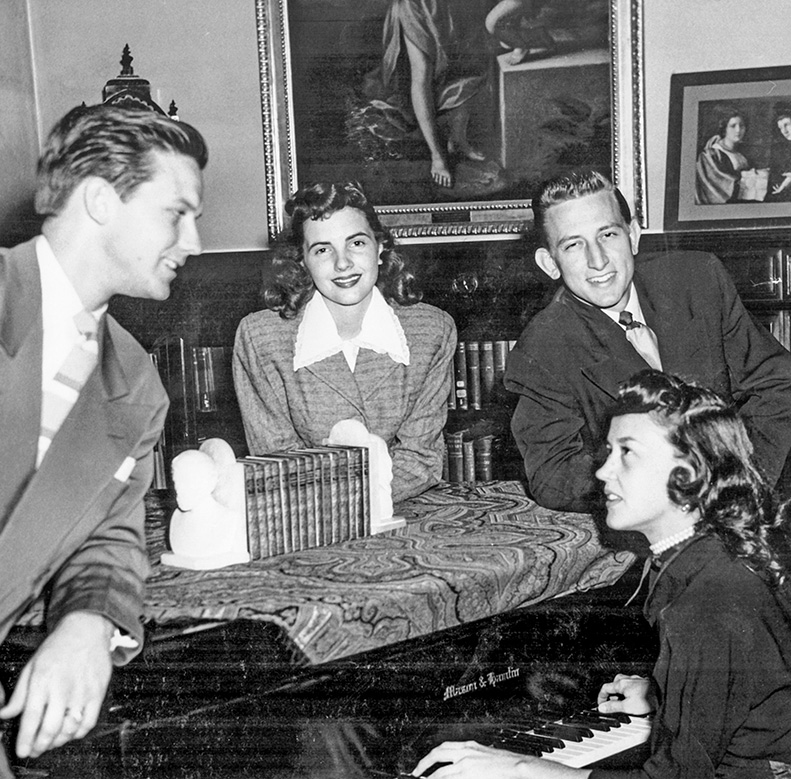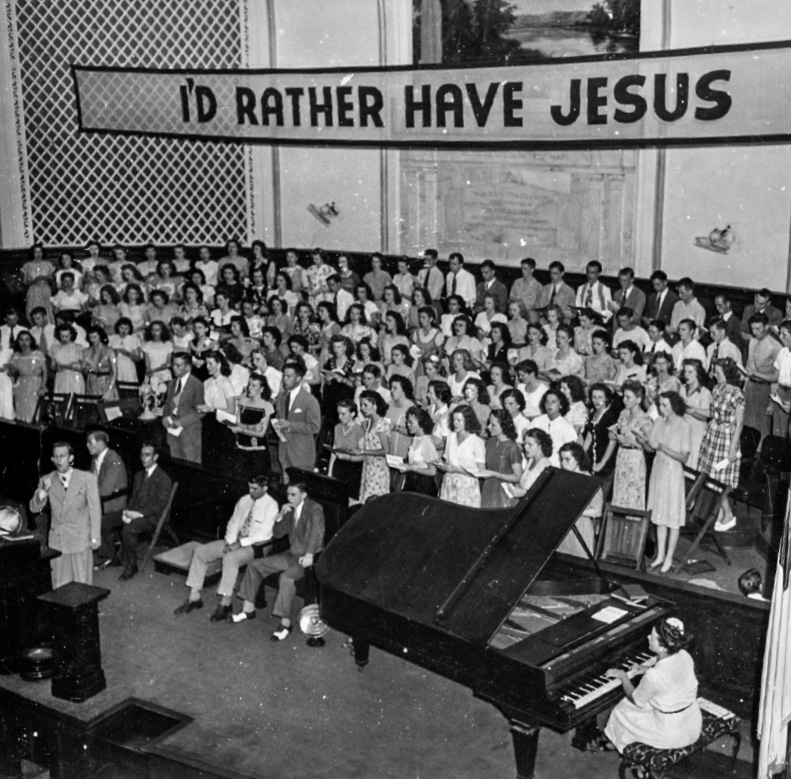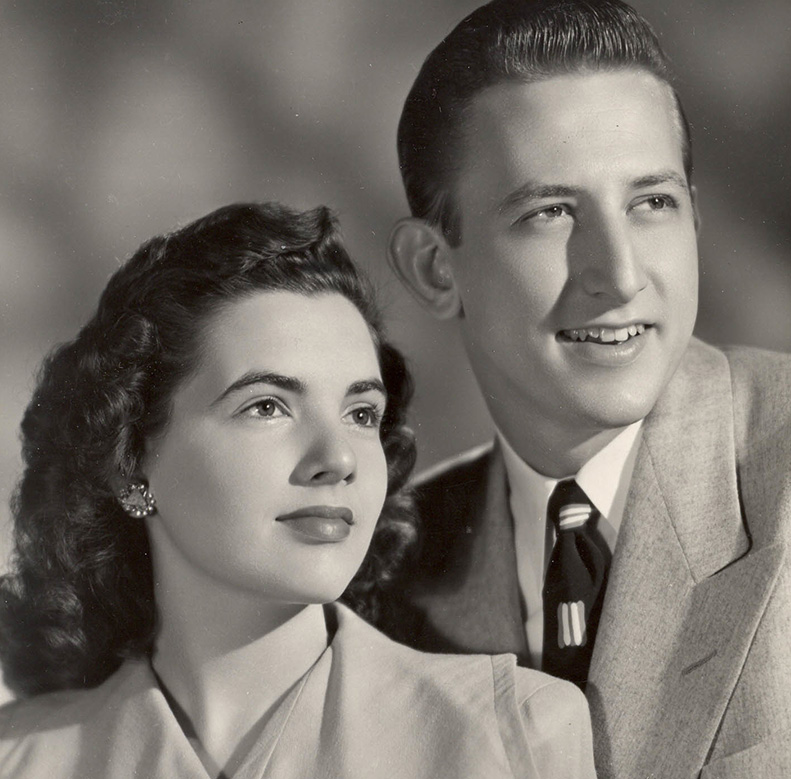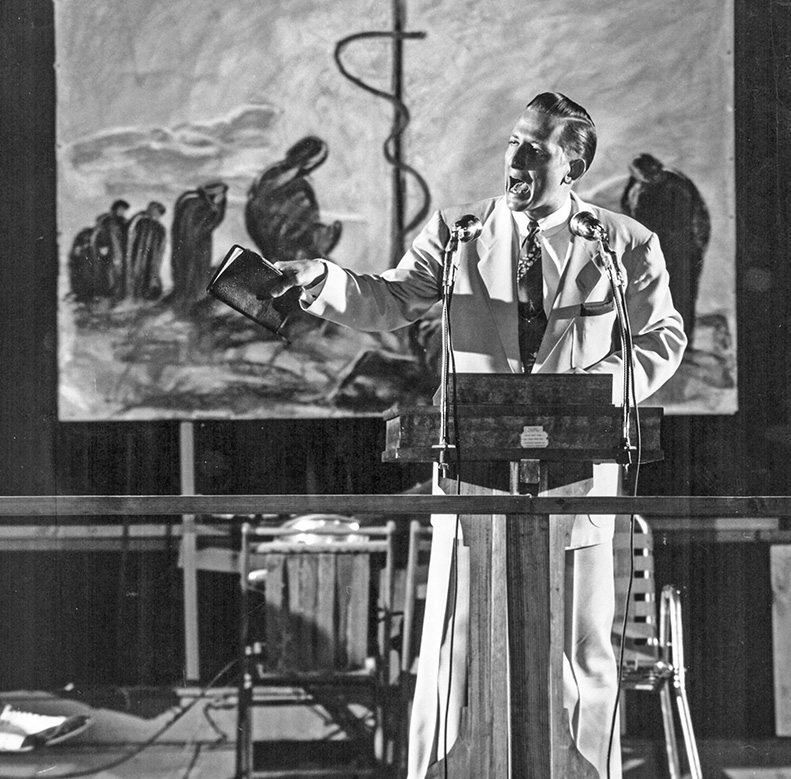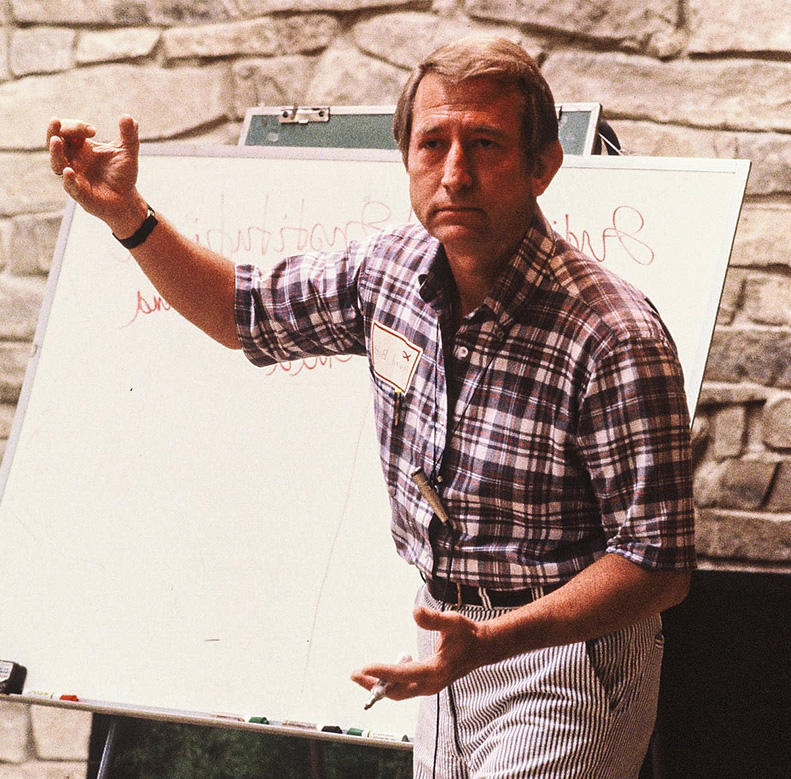Retreat to Advance
For more than 50 years, Laity Lodge, operated by The H.E. Butt Family Foundation, has provided Christians with a chance to retreat from the day-to-day and "recover a sense of the sacred."
About 80 miles west-northwest of San Antonio, nestled deep in the Texas Hill Country, Laity Lodge is an ecumenical retreat center that offers its guests peace and spiritual renewal in a beautiful space overlooking the Frio River Canyon. Thoughtfully curated weekend retreats encourage renewal, relationship and reflection on the profound goodness of God and the high calling of one’s work, no matter the nature of that work.
As an ecumenical retreat center, the Lodge is not affiliated with any specific denomination. Every three- or four-day retreat at Laity Lodge includes at least one guest speaker who may bring a background in any number of Christian traditions, an artist and a musician for the weekend. And the natural beauty of the Canyon cannot be overstated, Brandon Dickerson, BA ’94, director of Laity Lodge, says.
“I’ll invite friends from California who aren’t familiar with the Texas Hill Country, and they wonder why on earth they should leave their hometown beaches and the mountains to come to Texas,” Dickerson says. “Once they come to unplug and experience a Lodge retreat in the overwhelming natural beauty of the Frio Canyon along with the inspired architecture overlooking the water, they immediately want to sign up for another retreat. There is something profound about people gathering together with the intention of seeking God in the same beautiful place for over 50 years. When I first came as a guest in 2014, I came back to four retreats in less than a year. There is something rare and very special you discover in this dedicated space.”
The name itself, Laity Lodge, is not meant to exclude clergy, but rather underscores the vital role of lay leadership—the daily and intentional participation by all believers in building God’s kingdom.
Founded by Howard Butt, Jr., in 1961, Laity Lodge has been welcoming guests to retreats designed to reawaken a sense of the sacred—the nearness and goodness of God in all of life—ever since. Photo / Wendi Poole
This idea was a driving passion of the late Howard Edward Butt Jr., BA ’47, the founder of Laity Lodge. Perhaps no one had a greater understanding of the necessity among Christians to integrate faith and work, ministry and career.
A High Calling
Born in 1927, Howard Jr. was the oldest child of Howard Butt Sr. and Mary Holdsworth Butt and heir apparent to the family’s grocery business. Today, H.E. Butt Grocery (H-E-B) reports $23 billion in annual sales and is the 12th largest privately held company in the United States, according to Forbes magazine.
At first blush, it would appear that Howard Jr. was set from birth; however, when he graduated from Baylor in 1947 with a degree in business administration, he embarked on an adult life marked by constant tension between his responsibilities to the family business and a calling he recognized while he was at Baylor.
“Well-meaning friends wanted to pigeonhole me into one, easy-to-explain role,” he wrote in a 2006 article for The H.E. Butt Family Foundation newsletter Connections. “I felt called to the ministry of preaching, but I felt called to serve God in the grocery business, too.”
Howard Jr. was a college student during the Second World War. He started classes at Baylor in the fall following D-Day, at which time the country had been at war nearly four years. College enrollment nationwide had dropped by half and few Baylor students hadn’t experienced a father, brother, husband or friend enlisting or being drafted into military service. The defeat of European Axis powers was imminent and a shared sense of patriotism imbued the American consciousness, but a spiritual void had opened in the U.S. This vacuum and a way of life beset by uncertainty provided the stage for what became known as the Youth Revival Movement of the 1940s and 1950s—a significant moment in Baylor history and the history of American religion.
Howard E. Butt Jr. with his wife Barbara Dan playing the Piano
In his 2002 book Riding the Wind of God: A Personal History of the Youth Revival Movement, Bruce McIver, BA ’46, a classmate of Howard Jr., recalls, “We learned painfully the meaning of the word ‘wait.’ Waiting stimulated a lot of soul-searching, and faith became a day-by-day way of life. Would [God], could [God] take all the debris and wreckage around us and hammer out His purpose? Would we, could we, be a part of that? Was there some way we could help build a better world?”
What began as intimate prayer meetings among members of the University’s Baptist Student Union, petitioning the Lord for a renewal of faith among young people, quickly exploded into student-led, student-
preached revivals—massive gatherings that took place on college campuses, in church sanctuaries, in gyms and in stadiums across the Southeast and throughout the country.
”This was not a matter of ego; it was a matter of divine urgency.”
“Interestingly, the students themselves did most of the talking … not the administration, nor the faculty, nor guest speakers,” McIver writes in Riding the Wind of God. “There was a sense in which it was our world, our responsibility and our special moment in history. This was not a matter of ego; it was a matter of divine urgency.”
As a chairman of the Baylor Youth Revival Movement, Howard Jr. had traveled thousands of miles across multiple states by the time he graduated and had become a rather popular speaker alongside several classmates and fellow leaders of the movement.
In 1949, Howard Jr. married his long-time love Barbara Dan Gerber, BA ’49, and the couple had three children within 10 years. During that period, life was full to say the least. He devoted his weekdays to the grocery business. He was managing his own store, overseeing operations, merchandising and marketing. On the weekends, he was preaching and traveling.
Howard Jr. pioneered several concepts that are now hallmarks of contemporary, mainstream Christianity, including “small groups,” the idea of “work-life balance” and the importance of “servant leadership.” He served as an associate evangelist with the Billy Graham Evangelistic Association; and he addressed one of the first National Prayer Breakfasts, hosted by President Dwight D. Eisenhower in 1956. He was also a founder of Christianity Today magazine.
“He and Billy Graham developed a friendship and Howard Jr. did crusades with Graham in Scotland and other places,” says former H.E. Butt Family Foundation legacy steward Dan Roloff, who retired in March after 35 years of service to the foundation in various roles. “Together they started the Layman’s Leadership Institutes in the ’50s that had a profound influence on a lot of business people in particular.”
The pace of his life—juggling such demanding and ever-competing priorities—eventually pulled Howard Jr. into a deep depression in 1959.
“He couldn’t live life so compartmentalized,” Roloff says. “He didn’t want to have the grocery business over here and evangelism over here and his family responsibilities over here. He wanted them together, integrated.”
Howard Jr. sought professional help in a time when the need for psychiatry or counseling was viewed as a weakness in evangelical circles, including his own. Unfortunately, many of his contemporaries distanced themselves from Howard Jr., adding to a feeling of isolation. Counseling helped him recognize thoughts, attitudes and patterns of which he hadn’t been cognizant, helping him to move through this time of acute depression. Going forward, he was open about his struggle with depression, first among friends and in the intimate setting of Laity Lodge, and eventually on bigger stages. He was committed to modeling vulnerability and transparency.
As president of the Butt Family Foundation from its inception in 1934 until 1982 and as someone who loved to build, Mary Holdsworth Butt oversaw the design and construction of Laity Lodge—the main buildings containing the Great Hall, dining facilities and guest rooms. Upon its completion, Mary gave it to Howard Jr. “We want this place to be a tool in your hands,” she told her eldest son.
Roloff says the Butt family built Laity Lodge so Howard Jr. would have a place to retreat from life’s demands.
“And a place where he could bring in leading theologians and they could have conversations about the Christian faith—a laboratory, a physical space to have a Christian ‘think tank’ in a way,” Roloff says.
The first gathering at Laity Lodge in 1961 included Elton Trueblood, a Quaker theologian, and Keith Miller, an oilman from Oklahoma. Howard Jr. was diving right into the intersection of sacred and secular, establishing an ethos that would infuse every retreat that followed for the next five decades.
So powerful was the experience that Miller took a hiatus from the oil business to study theology and would become the first director of Laity Lodge.
“God was pushing me in a new and unfamiliar direction,” Howard Jr. wrote in a 2007 article for Connections. “It was one of those times when you say something out of the blue and you just know it is from God: ‘We retreat to go forward,’ I said. ‘We retreat to advance.’”
Not long after that first retreat, Howard Jr. ceded his vice presidency of daily operations at H-E-B to his younger brother Charles. In 1982, Howard Jr. succeeded his mother as president of The H.E. Butt Family Foundation. He continued what would be a 60-year career of blending the sacred and secular, retreating to advance, and bringing Christians of all denominational backgrounds together to discuss, discover and rest in God’s presence.
Howard Jr. also developed a daily radio address called “The High Calling of Our Daily Work” in 2001. Many may remember his voice—“This is Howard Butt Jr. of Laity Lodge”—sharing brief stories and reflections to encourage morning commuters on their way to work.
Late in life, Howard Jr. suffered complications from Parkinson’s Disease. At age 89 years nearly to the day, Howard Edward Butt Jr. passed away surrounded by family at his home in San Antonio.
Serene Get Away
Upon visiting the 1937-acre stretch of land along the Frio River for the first time, Howard Butt Sr. is said to have been so moved by the beauty of the place, he removed his three-piece suit and dived into Blue Hole, a beloved swimming hole on the property.
In addition to such staggering natural beauty, Laity Lodge offers a kind of isolation that is difficult to find in an age of smartphones and Wi-Fi availability in moving vehicles.
“Beyond the waves of cell coverage, we embrace the opportunity for guests to be present throughout their retreat,” Dickerson says. “We intentionally offer Wi-Fi in one hour increments, if needed, to consider a thoughtful rhythm to technology. Most guests admit they arrive with some concern about being off the grid, but they leave with a big ‘thank you’ to us for encouraging an unplugged weekend.”
The Lodge also has landlines available and a 24-hour number to call if someone needs to reach a guest.
”We have an agenda, but we don’t have an agenda for you.”
Dickerson says guests are greeted in the Great Hall with an interesting phrase at the beginning of a retreat: “We have an agenda, but we don’t have an agenda for you.”
“We plan an incredible retreat with inspired speakers, musicians and artists, and yet we want to provide an open, hospitable space for guests to renew and refocus with plenty of room to breathe in the way they need,” he says. “On a four-day retreat, there’s a light touch on your first day. On the following days, we settle into a rhythm of two morning sessions followed by a meal, and then the afternoon is your own to hike, swim, rest or engage in an art activity. Saturday evening is a concert, and we end our time together with worship on Sunday morning before brunch. Our desire is for guests to leave the weekend refreshed and restored.”
When compared with other retreat experiences offered around the world, perhaps the most remarkable asset that sets Laity Lodge far apart is the generosity of The H.E. Butt Family Foundation. The kind of experience that may cost four times as much elsewhere, according to Dickerson, is available for less than $500 for food and lodging for a four-day stay at Laity Lodge, and need-based scholarships available.
“We want guests to enjoy the kind of hospitality they would find on a wonderful getaway as well as the same qualities you get at a monastery,” Dickerson says. “I agree with guests when they note that there is a ‘monastic elegance’ to Laity Lodge. And the generosity of the foundation is what makes these profound experiences accessible.”
